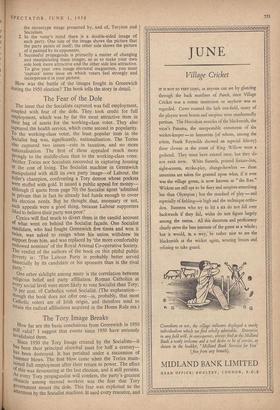The Fear of the Dole
The issue that the Socialists captured was full employment, coupled with fear of the dole. They took credit for full employment, which was by far the most attractive item in their bag of assets for the working-class voter. They also captured, the health service, which came second in popularity. To the working-class voter, the least popular item in the Socialist bag was, significantly, nationalisation. The Tories also captured two issues—cuts in taxation, and no more nationalisation. The first of these appealed much more Strongly to the middle-class than to the working-class voter. Neither Tories nor Socialists succeeded in capturing housing or the cost of living. The Socialist machine in Greenwich manipulated with skill its own party image—of Labour, the toiler's champion, confronting a Tory demon whose pockets Were stuffed with gold. It issued a public appeal for money— although (I quote from page 70).the Socialist agent 'admitted in private that in fact he already had funds enough to cover his election needs. But he thought that, necessary or not, such appeals were a gOod thing, because Labour supporters liked to believe their party was poor.' Cynics will find much to divert them in the candid account of what went on behind the Socialist façade. One Socialist candidate, who had fought Greenwich five times and won it twice, was asked to resign when his union withdrew its support from him, and was replaced by 'the more comfortably endowed nominee' of the Royal Arsenal Co-operative Society. The verdict of the authors of the book on this pitiful public Poverty is : 'The Labour. Party is probably better served financially by its candidate or his sponsors than is the rival Party.'
One other sidelight among many is the correlation between religious belief and party affiliation. Roman Catholics at every social level were more likely to vote Socialist than Tory; ,., '0 per cent. of Catholics voted Socialist. (The explanation— though the book does not offer one—is, probably, that most Catholic voters are of Irish origin, and therefore tend to retain the radical affiliations acquired in the Home Rule era.)


































 Previous page
Previous page